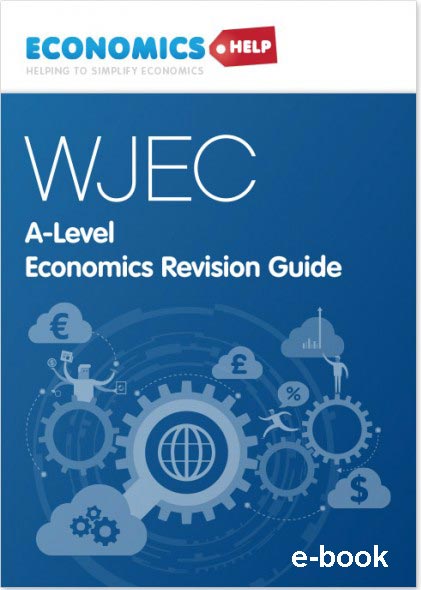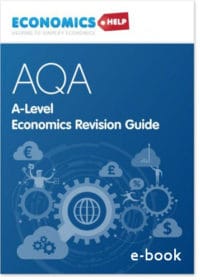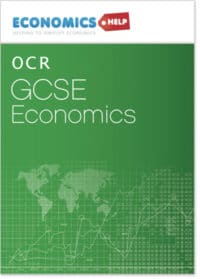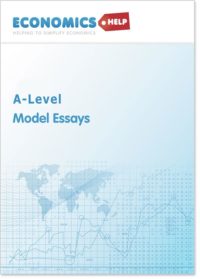WJEC A-level economics revision guide
£8.95
- Specific WJEC A-level economics revision guide (units 1,2,3,4) – just £8.95
- Updated for the new WJEC economics syllabus. Last updated June 2022.
- E-book (comes in pdf format shortly after purchase.)
- Also suitable for Eduqas. Eduqas is part of WJEC and it is the same syllabus.
- Trademark simplicity and clarity of presentation.
- Significantly expanded on previous version, with not just required knowledge, but also examples of evaluation for each topic.
- For schools – See: Network License – A-level WJEC Economics (£105.00) (allowing unlimited use)
Description
- Recently updated and expanded
- It is designed specifically for WJEC / Eduqas A level economics.
- AS unit – 98 pages, 19,000 words
- A2 micro – 42 pages, 11,000 words
- A2 macro – 75 pages, 19,000 words
- Total revision guide (AS+A2) 215 pages – 49,000 words
Note on WJEC / Eduqas
Eduqas is part of WJEC. Eduqas is the name used in England and Northern Ireland. It is the same content, (though minor changes in context, e.g. WJEC uses examples from Wales.)
A Level economics revision guide (E-Book)
- Simple yet detailed.
- Content designed to help prepare for likely questions.
- All main diagrams needed for A Level Economics
- Tips on writing evaluation – Essential for getting top grades
- Updated: 2022
- Revision Guide sent shortly after purchase.
- Two page Sample WJEC
AS WJEC revision guide
If you would like to buy just WJEC AS Revision guide (unit 1 and 2)
Content
Unit 1 – Micro economics
- Scarcity, choice and opportunity cost
- Opportunity cost
- Production possibility frontiers (PPF)
- Possibility frontier and economic growth
- Specialisation
- Markets
- Demand
- Supply
- Market equilibrium
- Consumer surplus
- Producer surplus
- Elasticity
- Using knowledge of elasticity
- The impact of elasticity on tax
- Income elasticity of demand (YED)
- Cross elasticity of demand
- Price elasticity of supply
- Tax
- Wage determination
- National minimum wage
- Flexible labour markets
- Impact of net migration on UK labour markets
- Evaluation of net migration
- How resources are allocated in a free market
- Market Failure
- Externalities and social efficiency
- Negative externality
- Positive externality
- Public good
- Information gaps
- Merit good
- Demerit good
- Government intervention to correct market failure
- Tax
- Subsidy
- Maximum prices
- Problem of maximum prices
- Minimum prices
- Tradeable pollution permits
- State provision of public services
- Advertising / Information
- Regulation
- Policies of Welsh government
- Government failure
Unit 2 – The UK Economy
- Circular flow of income
- Injections
- Withdrawals (W) (leakages)
- Multiplier effect
- Aggregate demand
- Consumer spending (C)
- Investment
- Government expenditure (G)
- Net trade (X-M)
- Aggregate supply (AS)
- Equilibrium national income
- Government macro economic objectives
- Conflicts between objectives
- Fiscal policy
- The National Debt
- Government spending
- Taxation
- Supply side policies
- Monetary Policy
- UK monetary policy
- The role of the central bank
- Exchange rates
- Factors that influence exchange rates
- Appreciation in the exchange rate
- Evaluation of an appreciation
- Trade
- Benefits of free trade
- Arguments for restricting trade
Unit 3 – Microeconomics
- Costs of production
- Law of diminishing returns
- Economies of scale
- Revenue
- Profit
- Profit maximisation
- The growth of firms
- Types of efficiency
- Market structures
- Examples of barriers to entry
- Contestable markets
- Business objectives
- Perfect competition
- Monopolistic competition
- Monopoly
- Price discrimination
- Oligopoly
- Collusion
- Nash equilibrium
- Competition policy
- Mergers
- Privatisation
- Public ownership
- Regulation of privatised industries
Unit 4 – Macroeconomics
- Aggregate supply (AS)
- The Phillips curve
- Economic growth
- Output gaps
- Unemployment and employment
- Inflation
- Deflation
- The balance of payments
- Terms of trade
- Fiscal policy
- Government borrowing
- The national debt
- Monetary policy
- Financial stability
- Regulation of the financial system
- International trade
- Globalisation
- Economic integration
- Euro/ Monetary union
- Economic development





